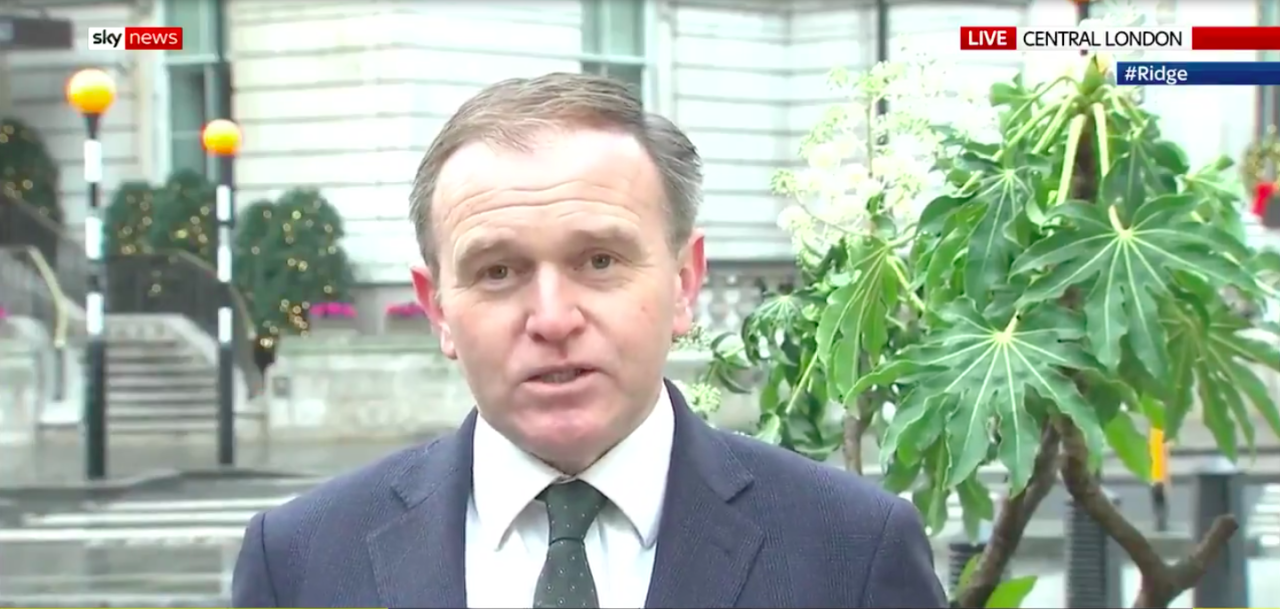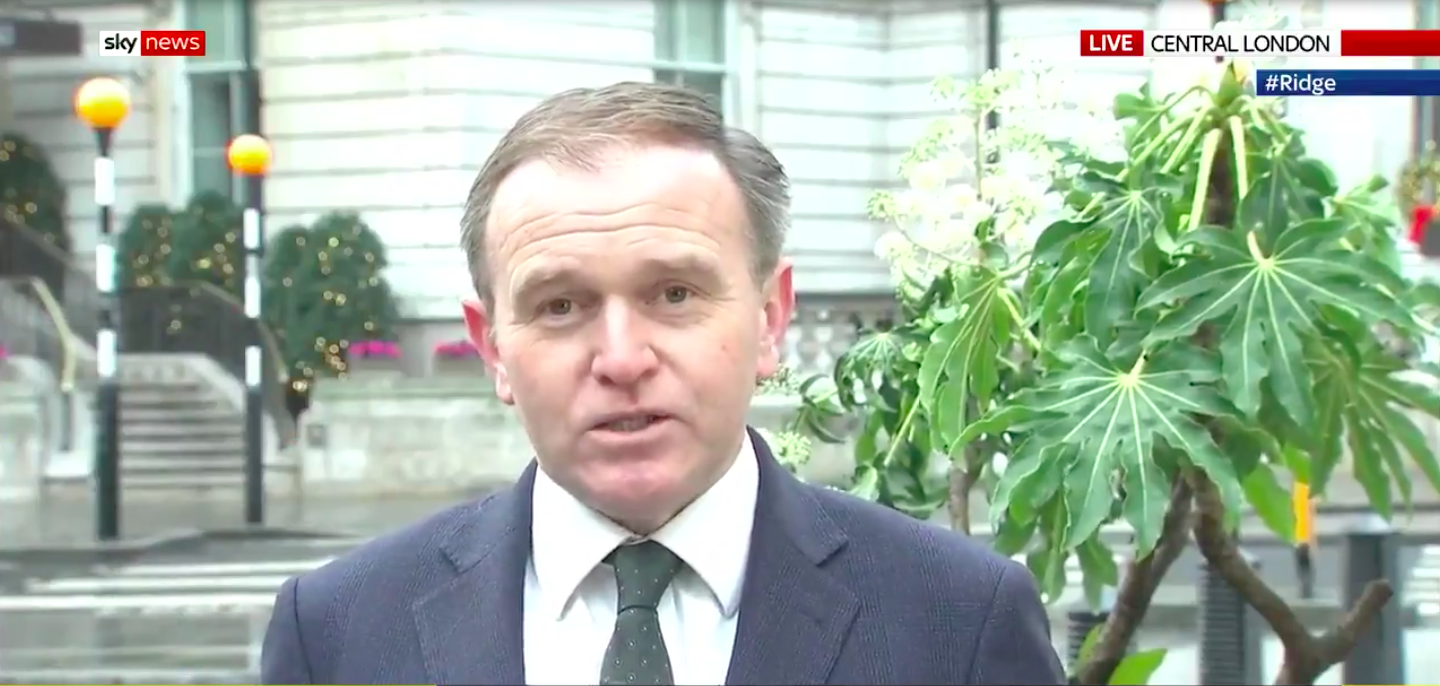Sophy Ridge was joined this morning by the Environment Secretary George Eustice. The first item on the agenda was the reconvening of post-Brexit trade talks after negotiators failed to reach an agreement last week. Eustice confirmed that EU demands on access to British coastal waters and on state aid were still the key barriers to a deal:
GE: These [talks] are… in a very difficult position, there’s no point denying that… There was some hope early last week… at one point it looked like there might be a breakthrough… We’re going to continue to work on these negotiations until there’s no point in doing so any further.
‘We will see’ if promises can be kept to farmers and fishermen
Eustice also spoke to Andrew Marr. Marr asked Eustice, as the cabinet minister overseeing both fisheries and farming, if the government was destined to disappoint one of the key industries it had given assurances to:
GE: We will see. Time will tell, but we’ve got certain very clear principles here… We cannot be the only country in the world which does not control its own waters.
Effect of tariffs on food prices ‘is quite modest’
With a no-deal looking ever more likely, Marr put it to Eustice that inflation of food and drink prices was a spectre that could haunt the government if the talks break down yet again. Eustice argued that tariffs on imported goods were less significant than a range of other factors:
GE: There would be some impact on prices, but the analysis that’s been done by some of the people who have economically modelled this is that it’s quite modest – probably less than 2 per cent as a result of tariffs. It would be higher on some things such as beef and pork, but… the impact of tariffs on food prices is quite modest.
Government will reinstate Internal Market Bill clauses
Ridge asked Eustice if the government’s Internal Market Bill, aimed at protecting Northern Ireland’s position within the UK, could reinstate controversial clauses which Northern Ireland Secretary Brandon Lewis described as breaking the Withdrawal Agreement in a ‘specific and limited way’. The clauses have been removed by the House of Lords, but could be reapproved by the House of Commons if the government tables it again:
GE: Yes, we will. These clauses are very important… particularly in the event that we leave without an agreement…. Where the joint committee process between the UK and the EU fails to come up with clarity about how the Northern Ireland protocol should be interpreted, it’s absolutely crucial that the UK government has the powers to provide [that] legal clarity.
No deal Brexit will not affect Covid vaccine deployment
Eustice was sanguine about the possible effects that a no-deal Brexit might have on the Pfizer vaccine reaching UK shores, insisting that multiple preparations had been made to ensure that there would be no disruption:
GE: Huge amounts of work has gone on to maintain the flow of goods at the [EU] border… A government procured ferry [is] on standby… We’ve got many contingency plans in place. There won’t be any effect on the deployment
NHS boss says 800,000 doses of vaccine are on their way
Ridge had asked Eustice for more details about the vaccine roll-out, but precious little had been forthcoming, even on the amount of vaccine doses that were inbound for the UK next week. Instead, she turned to Saffron Cordery, the Deputy CEO of NHS Providers, for more illumination on the subject:
SC: We know that the first batch of 800,000 [doses] is on its way to the country now. We know that many of the 50 hospital hubs up and down the country have already received their allocation… Up to 4 million doses [should] be with us by the end of December.
Vaccine approval process ‘incredibly robust’
Barker continued by saying that people should not be put off by the speed with which the Pfizer vaccine has been given the go-ahead, amid concerns that the process may have been rushed:
SC: The authorisation and approval process has been incredibly robust. Yes, it has been shorter than other vaccine approval processes, but that’s because everything has been thrown at this all in one go, rather than the much more bureaucratic process that we’ve seen with other vaccine approvals.
Rachel Reeves — ‘We can’t say how we’re going to vote’ on trade deal just yet
Marr also interviewed the shadow cabinet office minister Rachel Reeves. Labour has consistently argued that a no-deal outcome would be catastrophic for the UK, but Reeves told Marr that her party would be keeping its options open for when and if the deal is bought to a vote:
RR: We’ve been very clear that we want the government to get a deal… We can’t say how we’re going to vote… without seeing the legislation… Keir Starmer and myself will make sure that we understand the implications of any legislation before voting on it.
Gordon Brown — No-deal would mean ‘economic war’ with EU and US
Ridge interviewed the former prime minister Gordon Brown, who issued a stark prediction about the impact of failing to reach a trade agreement:
GB: If there is no deal now, I see huge international implications… because we would be in an economic war with Europe that would cost us very dearly – food, drugs and everything else… But we’d also be in an economic war with America, because there’d be no chance of a trade treaty with America. And so, Boris Johnson is going to end up as the most isolated Prime Minster in peacetime history.
Unionists would win referendum on Scottish independence
However, Brown was far more optimistic on the state of the Union, despite the recent groundswell in support for independence, if the polls are accurate. However, he added that the entire UK needed to see more power devolved away from Whitehall:
GB: I think if there was a referendum, we’d win it and Scotland would stay in the United Kingdom, but it’s going to be a hard battle… I see a sense growing across the whole of the UK… that Westminster is out of touch… and I think we’re going to have to get a far better balance between the powers that the nations and regions hold.
Rishi Sunak’s problems ‘are now beginning’
Brown also gave his verdict on the man doing the job that he held for ten years. He argued that Rishi Sunak’s golden period as Chancellor was nearing its end:
GB: Having given out all this money, his problems are really now beginning… I supported what he did in March… [but] he has not provided for the recovery in the way that should be done, and that will decide his fate.
French MP says any EU country can veto the trade deal
The French MP Alexandre Holroyd, who represents President Macron’s party of En Marche!, reminded Marr that France was just one of many EU countries that had the power to bring a trade deal crashing down:
AH: Every member state of the EU is liable to veto this deal, or is liable to accept it. Just as incidentally, the British Prime Minister is absolutely liable to veto the deal as well… This deal will be examined by every capital in the European Union.
Drugs regulator says ‘we’re ready’ whatever the deal
And finally, Dr June Raine, the Chief Executive of the Medicines and Healthcare products Regulatory Agency — the body which approved the Pfizer vaccine for use in the UK – told Marr that Eustice was right to have faith in the deliverability of the roll-out:
JR: Our goal… is to make sure that whatever the outcome, whatever the deal, that medicines and medical devices and vaccines reach anyone in all parts of the country… without any interruption. We’ve rehearsed, we’re ready and we know that whatever the deal, we’ll be able to make sure that people have access.







Comments